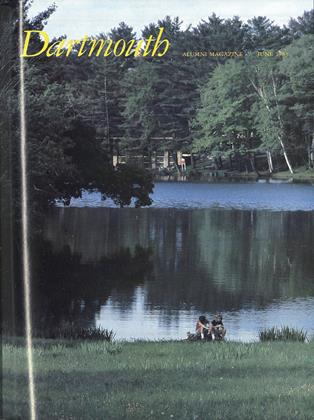Late in April, the College sponsored a five-day Ivy League Conference and the Dartmouth Senior Symposium on Nuclear Arms. With 55 undergraduate representatives from the Ivy League schools and literally hundreds of other people of all ages in attendance, audiences packed the debates, lectures, and meetings that addressed the state of the world's nuclear arsenals from various perspectives political, moral, and technical.
"Wars fought with any sort of weapons are not jolly adventures," declared author and Montgomery Fellow Kurt Vonnegut at the Conference's closing session; "they are the most repulsive of all diseases."
Fr. Robert Drinan, a former U.S. congressman who currently teaches law at Georgetown University, averred, "There is something fundamentally wrong with the morality of our foreign policy. ... A nation cannot have a foreign policy based on the threat of the annihilation of 200 million people."
And Dartmouth senior Peter Hussey, author of the first prize paper in the Ivy League essay contest, asked, "With the fate of all life on earth potentially at stake, can we continue to base our policies on moral standards that emerged in the cauldron of World War II and have existed in the world for 40 years?"
Views such as these were representative of the sentiments expressed at the conference by scholars, policy-makers, students, and others concerned about the nuclear arms race.
The Ivy League Conference and Senior Symposium constituted one visible part of Dartmouth's long-term commitment to international understanding. In April 1982, the College's Board of Trustees made explicit their belief that Dartmouth should commit educational resources to the consideration of nuclear danger.
The one disappointment in an otherwise exceptional week was the failure of former Secretary of State Alexander Haig to address the Conference. He entered a Washington hospital the day before he was to deliver the keynote address. Arrangements are now being made to have Haig deliver his speech on the Hanover Plain in the near future, according to President McLaughlin, who has taken an active role in working to educate the campus on this issue. The Program for Education on the Threat of Nuclear War, the organization that was developed to respond to the Trustee statement, has brought such figures as William Sloane Coffin and Soviet Ambassador Oleg Troyanovsky to the campus.
Though the delegates have returned to their respective schools, work from the Conference continues. Organizers here are hoping that this meeting of minds can become an annual event, focusing on different topics and held at different schools each year.
Dartmouth organizers of this first Conference are trying to spread the results of these discussions to those who actually determine American nuclear weapons policyAnn Schonfield '85 was busy mailing the results of these student discussions to all the members of the U.S. Congress, as well as to others influential in WashingtonSchonfield, who has given up her spring term to do "more than full-time' work for the Conference, said that plans are under way to publish the best student papers submitted to the Conference. President Emeritus John G. Kemeny, who among the scientists and professors developed the first atomic bomb, hsa agreed to write the forward to this boo
 View Full Issue
View Full Issue
More From This Issue
-
 Feature
FeatureThe View from the Women's Locker Room
June 1983 By Agnes Kurtz -
 Feature
FeatureHigh Tech Crisis
June 1983 By Shelby Grantham -
 Feature
FeatureKeeping Dartmouth Diverse
June 1983 By Steve Farnsworth '83 -
 Feature
FeatureJustifiable Pesticide
June 1983 By Robert Bell '67 -
 Cover Story
Cover StoryIn Ledyard's Wake
June 1983 By Jean Hanff Korelitz '83 -
 Feature
FeatureHomely Truths
June 1983 By S.G.







